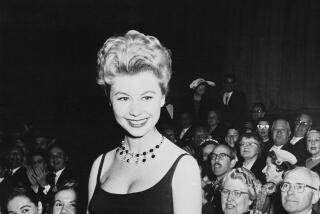Ziggy’s Reggae Is Eclectic, but in a Family Way
- Share via
This has been quite a month for Ziggy Marley. About three weeks ago, he and his band, the Melody Makers, performed at a gala event in Jamaica celebrating the birthday of his late father, reggae giant Bob Marley.
“Works to Do,” a single commemorating the legendary artist’s life and music, was simultaneously released in Jamaica by Ziggy Marley and the bandwhich includes brother Stephen and sisters Cedella and Sharon. It’s currently the top-selling song in Marley’s home country.
On Feb. 6, Universal Studios in Orlando, Fla., announced plans to create a Bob Marley exhibit, which will include replicas of his house, garden and recording studios in Jamaica.
“It will show the life of our father and his music,” Ziggy Marley says. “It will also be a place where people can go and learn about the Jamaican and Rastafari cultures that influenced his life. We’re going to have some say in how the exhibit will be done. So it’s going to have approval from the Marley family.”
Marley, who will perform with the Melody Makers tonight at the Freedman Forum Concert Theatre in Anaheim, is obviously proud of his father’s accomplishments and status as a musical hero. During the 1970s, Bob Marley almost single-handedly defined reggae. His impressive canon of work caused some to enthusiastically predict that this style of Afro-Caribbean music would become popular in the United States. But after Bob Marley died of cancer in 1981 at the age of 36, reggae lost much of the momentum it had accumulated in America.
When David “Ziggy” Marley emerged in 1985 with his first album, “Play the Game Right,” many hoped that the then-17-year-old would develop into a creative and symbolic force on a par with his dad. Physically and vocally, Ziggy and Bob Marley are eerily similar.
But a decade and several record label switches after his debut album--he started with EMI, migrated to Virgin and recently moved to Elektra--Marley still finds himself largely in the formidable shadow of his famous father. His 1988 album, “Conscious Party,” and 1989’s “One Bright Day” both managed to crack the Top 30 in the U.S. But subsequent albums have fared less well.
Still, if Marley feels the pressure of being the most musically gifted child of reggae music’s most revered figure, he does a good job of concealing it in interviews. The reticent 27-year-old claimed in a recent phone interview that even as a teenage recording artist he didn’t feel the burden of his rich family roots.
“I don’t feel pressure,” he says simply, in his Jamaican patois. “I read a lot of things [in the press about comparisons to his father], but I don’t care what other people say. I just do what I do.”
What Marley does is produce an eclectic brand of reggae that has tended to veer more toward the pop spectrum than his father’s grittier music. His most recent album, “Free Like We Want 2 B,” is infused with pop, rap and soul influences.
Though his 1988 single, “Tomorrow People,” managed to reach No. 39 in the U.S. thanks to some valuable radio play, Marley--like just about every other reggae artist--has found American radio to be largely unresponsive to his music.
“Reggae music comes from a different culture, and a lot of radio stations in America aren’t open enough to accept other cultures into their own society and systems,” he argues. “They will always pick and choose commercially viable music to play on the radio. They will pick things in line with the format that they put on. But our intention isn’t to try to do songs for the radio. We do songs for the people. Reggae music will always be popular with the people.”
Some of Marley’s songs may be difficult to market in the U.S. because of their overtly political nature. (Indeed, reggae has a tradition of being socially conscious music.) In the song “G7” from “Free Like We Want 2 B,” he complains that the world’s seven richest nations conspire to exploit Third World countries.
Marley has mixed feelings about the United States.
“I love the people. It’s the system that I don’t like in America. I didn’t like the cowboy idea, what they did to the Indians and the black people there. A lot of things have changed, but that racist mentality is still there in America. . . .”
A father of three, Marley hopes to reach and influence younger people with his music. That’s one reason he agreed to record the song “Love Power,” written by Barry Mann and Cynthia Weil, for the current “Muppet Treasure Island” soundtrack.
“The youth are wide open to ideas,” he says. “They can be influenced negatively or positively, because their minds are fresh. If we can influence them positively, then we’ll have a positive society with people who love one another.”
Ziggy Marley and the Melody Makers play tonight at the Freedman Forum Concert Theatre, 201 E. Broadway, Anaheim. 8 p.m. $32. (714) 999-9599.
More to Read
The biggest entertainment stories
Get our big stories about Hollywood, film, television, music, arts, culture and more right in your inbox as soon as they publish.
You may occasionally receive promotional content from the Los Angeles Times.










